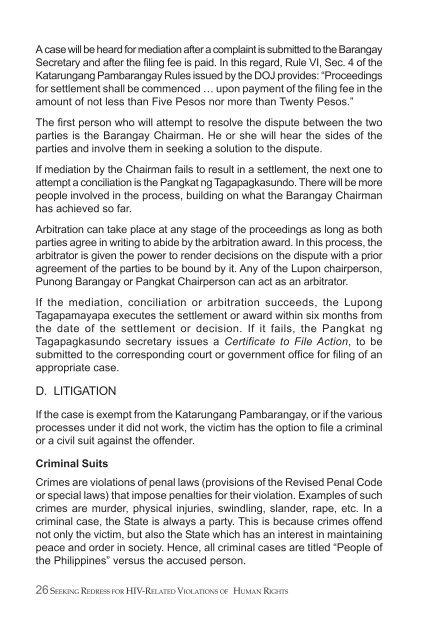Download this publication - AIDS Data Hub
Download this publication - AIDS Data Hub
Download this publication - AIDS Data Hub
- No tags were found...
You also want an ePaper? Increase the reach of your titles
YUMPU automatically turns print PDFs into web optimized ePapers that Google loves.
A case will be heard for mediation after a complaint is submitted to the BarangaySecretary and after the filing fee is paid. In <strong>this</strong> regard, Rule VI, Sec. 4 of theKatarungang Pambarangay Rules issued by the DOJ provides: “Proceedingsfor settlement shall be commenced … upon payment of the filing fee in theamount of not less than Five Pesos nor more than Twenty Pesos.”The first person who will attempt to resolve the dispute between the twoparties is the Barangay Chairman. He or she will hear the sides of theparties and involve them in seeking a solution to the dispute.If mediation by the Chairman fails to result in a settlement, the next one toattempt a conciliation is the Pangkat ng Tagapagkasundo. There will be morepeople involved in the process, building on what the Barangay Chairmanhas achieved so far.Arbitration can take place at any stage of the proceedings as long as bothparties agree in writing to abide by the arbitration award. In <strong>this</strong> process, thearbitrator is given the power to render decisions on the dispute with a prioragreement of the parties to be bound by it. Any of the Lupon chairperson,Punong Barangay or Pangkat Chairperson can act as an arbitrator.If the mediation, conciliation or arbitration succeeds, the LupongTagapamayapa executes the settlement or award within six months fromthe date of the settlement or decision. If it fails, the Pangkat ngTagapagkasundo secretary issues a Certificate to File Action, to besubmitted to the corresponding court or government office for filing of anappropriate case.D. LITIGATIONIf the case is exempt from the Katarungang Pambarangay, or if the variousprocesses under it did not work, the victim has the option to file a criminalor a civil suit against the offender.Criminal SuitsCrimes are violations of penal laws (provisions of the Revised Penal Codeor special laws) that impose penalties for their violation. Examples of suchcrimes are murder, physical injuries, swindling, slander, rape, etc. In acriminal case, the State is always a party. This is because crimes offendnot only the victim, but also the State which has an interest in maintainingpeace and order in society. Hence, all criminal cases are titled “People ofthe Philippines” versus the accused person.26 SEEKING REDRESS FOR HIV-RELATED VIOLATIONS OF HUMAN RIGHTS















